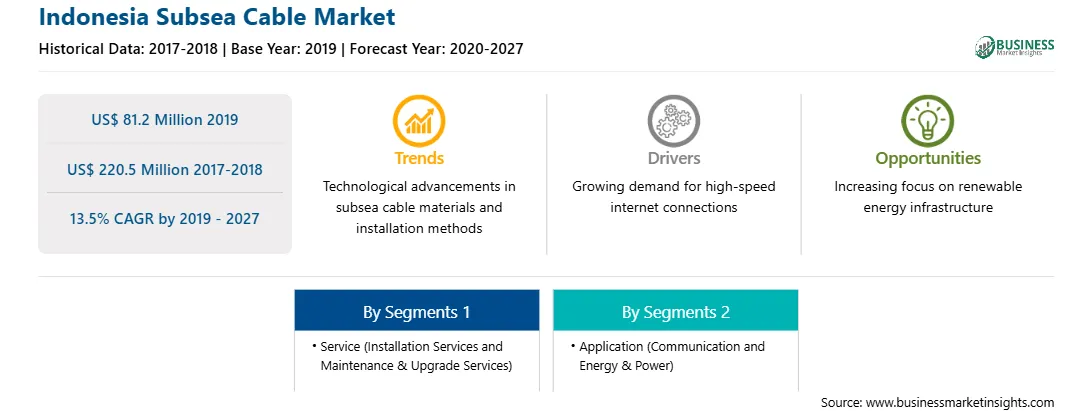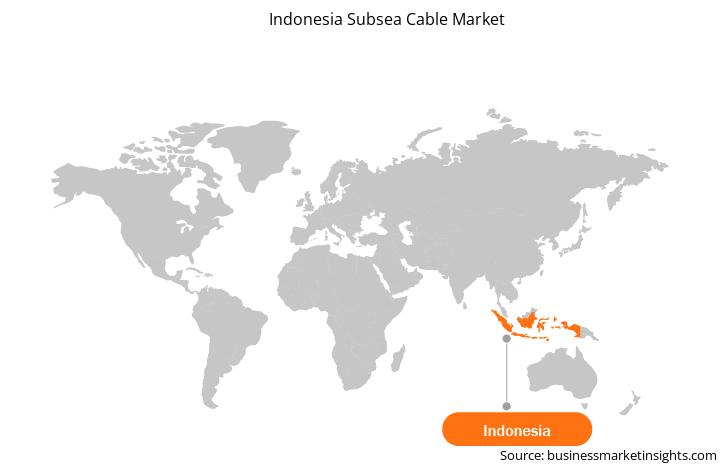In terms of revenue, the Indonesia Subsea cable market was valued at US$ 81.2 million in 2019, and it is expected to grow at a CAGR of 13.5% during the forecast period, to reach US$ 220.5 million by 2027
.
Indonesia is the fourth most populous country in the world and is the fourth-highest number of internet user in the world. As of January 2020, there were 175.4 million internet users in the country. This depicts an increase of 17% compared to that in 2019. Further, the internet penetration in the country is 64%. The country has observed increasing demands for internet bandwidths. Supportive government policies in the country for enabling a complete digitalized economy has further fuelled the needs for establishing a seamless internet infrastructure, thereby leading to the growth of the Indonesian subsea fiber optical cables network.
In 2019, the Indonesian government announced the completion of the Palapa Ring project. It is a crucial infrastructure project that is intended to deliver access to 4G internet services to over 500 localities across the country. The project was worth ~US$ 1.5 billion, and it included 35,000 km of undersea fiber-optic cables. Through this project, the government intends to attain speeds of up to 100 Gbps anywhere the country. Currently, the country’s dependency on uninterrupted data connectivity is increasing rapidly. With the rapid urge for bandwidth availability, there is a steadily rising need for fiber-optic-based interconnectivity. Most of the present intercontinental internet traffic is transmitted via subsea cables, which is mainly attributed to the high level of efficiency in transmission via subsea cables, compared to satellites. Subsea optical cables are capable of transmitting ~100% of the total international internet traffic, along with ~95% of the global combined data as well as voice traffic. The transmission of data traffic via subsea optical fiber cables features high reliability, capacity, and security; moreover, it is a cost-effective transmission method. Further, advancements in optical transmission technology help enhance data rate, channel count, and capacity; rising demand for video and data transmissions are anticipated to propel the growth of the Indonesia subsea cable market in the coming years.
Impact of COVID-19 Pandemic on Subsea CableMarket
On 15 March 2020, the Indonesian Government urged people to work from home as well as practice social distancing. Since then, several day-to-day activities from working to schooling have shifted online. This shift has resulted in a surge in digital communications services across the country.
The telecom network providers in Indonesia recorded growth in internet traffic as well as data communication after the Government’s instruction to stay at home. As per Telkomsel, a wireless network provider in Indonesia, the company recorded a 5% surge in data services post-March 15. Also, from studying several data communication services consumers accessed, the company saw a rapid increase in the demand for e-learning platforms by 236% with a 13% rise in online gaming services. Moreover, the company also recorded a 10.4% surge in traffic for cloud-computing services. Other services, which recorded increased traffic includes digital advertising, streaming services, and browser services. The rising demand for internet is expected to boost the growth of Indonesia subsea cable market.
Strategic insights for the Indonesia Subsea Cable provides data-driven analysis of the industry landscape, including current trends, key players, and regional nuances. These insights offer actionable recommendations, enabling readers to differentiate themselves from competitors by identifying untapped segments or developing unique value propositions. Leveraging data analytics, these insights help industry players anticipate the market shifts, whether investors, manufacturers, or other stakeholders. A future-oriented perspective is essential, helping stakeholders anticipate market shifts and position themselves for long-term success in this dynamic region. Ultimately, effective strategic insights empower readers to make informed decisions that drive profitability and achieve their business objectives within the market.

| Report Attribute | Details |
|---|---|
| Market size in 2019 | US$ 81.2 Million |
| Market Size by 2027 | US$ 220.5 Million |
| Global CAGR (2019 - 2027) | 13.5% |
| Historical Data | 2017-2018 |
| Forecast period | 2020-2027 |
| Segments Covered |
By Service
|
| Regions and Countries Covered | Indonesia
|
| Market leaders and key company profiles |
The geographic scope of the Indonesia Subsea Cable refers to the specific areas in which a business operates and competes. Understanding local distinctions, such as diverse consumer preferences (e.g., demand for specific plug types or battery backup durations), varying economic conditions, and regulatory environments, is crucial for tailoring strategies to specific markets. Businesses can expand their reach by identifying underserved areas or adapting their offerings to meet local demands. A clear market focus allows for more effective resource allocation, targeted marketing campaigns, and better positioning against local competitors, ultimately driving growth in those targeted areas.

Market Insights
Increasing Initiatives toward Development of Energy Sector is supporting the growth of Indonesia subsea cable market
The government implemented several measures in 2018 to foster investor appeal. One of these measures involved the relaxation of taxes by granting 100% corporate income tax reduction to new FDI projects in every business sector, given that they fulfill certain requirements. Apart from this, several foreign ownership restrictions were lifted in an effort to boost FDI inflows. The government withdrew 22 of 51 restrictions for business licenses in the energy sector, comprising those for oil & gas, electricity, and mineral resources. Additionally, it also announced its plan of rolling out the tax deductions of up to 200% for companies conducting R&D activities. However, downstream investment is anticipated to be boosted by a number of pipeline initiatives. In January 2018, BPH Migas announced that the government was preparing to auction three gas pipeline projects. Moreover, in 2018, an upstream project named the Indonesia Deepwater Development (IDD) projectalso made progress. More such developments in the energy sector are expected to continue to boost the growth of Indonesia subsea cable market during the forecast period.
Service-BasedInsights
In terms of service, installation service captured a larger share of the Indonesiasubsea cable market in 2019. Submarine cable system owners face the issues related to cable maintenance. For instance, during an unexpected network outage, clear channels of accountability, troubleshooting measures, problem escalation as well as awareness of spares availability are among the critical points that might be necessary to accelerate a network’s return to service as well as revenue generation. Also, the information and measures have to be up-to-date, accessible by decision-makers’ moreover, it should be backed up by the well-trained and expert teams. This highlights the vitality of cable maintenance and repair services; however, the know-how required is often not obtainable in-house. Several players in the subsea cable ecosystem offer maintenance and repair services, usually on a contract basis.
Strategic insights for the Indonesia Subsea Cable provides data-driven analysis of the industry landscape, including current trends, key players, and regional nuances. These insights offer actionable recommendations, enabling readers to differentiate themselves from competitors by identifying untapped segments or developing unique value propositions. Leveraging data analytics, these insights help industry players anticipate the market shifts, whether investors, manufacturers, or other stakeholders. A future-oriented perspective is essential, helping stakeholders anticipate market shifts and position themselves for long-term success in this dynamic region. Ultimately, effective strategic insights empower readers to make informed decisions that drive profitability and achieve their business objectives within the market.

| Report Attribute | Details |
|---|---|
| Market size in 2019 | US$ 81.2 Million |
| Market Size by 2027 | US$ 220.5 Million |
| Global CAGR (2019 - 2027) | 13.5% |
| Historical Data | 2017-2018 |
| Forecast period | 2020-2027 |
| Segments Covered |
By Service
|
| Regions and Countries Covered | Indonesia
|
| Market leaders and key company profiles |
The geographic scope of the Indonesia Subsea Cable refers to the specific areas in which a business operates and competes. Understanding local distinctions, such as diverse consumer preferences (e.g., demand for specific plug types or battery backup durations), varying economic conditions, and regulatory environments, is crucial for tailoring strategies to specific markets. Businesses can expand their reach by identifying underserved areas or adapting their offerings to meet local demands. A clear market focus allows for more effective resource allocation, targeted marketing campaigns, and better positioning against local competitors, ultimately driving growth in those targeted areas.

Application-BasedInsights
The Indonesia subsea cable market, by application, is segmented into communications and energy & power. The communication segment captured a dominating share in the Indonesiasubsea cable market in 2019. Subsea communications cablesare placed on the sea bed between land-based stations for transmitting telecommunication signals through stretches of sea and ocean. The Indonesian government commits to ensure telecommunications and broadband access for the country’s fast-growing population of ~264 million people. In line with this, several communication providers are deploying subsea cables to offer high-speed internet. For instance, in November 2018, Moratelindo, a broadband operator, announced its plans to deploy the countrywide fiber optic network by constructing the Jayabaya high-speed subsea cable system for Java Island. For this project, Nexans supplied 915-km fiber optic cables.The increasing demand for the internet in the country is expected to further boost the deployment of subsea cables for communication purposes. Several hyper-scale data center players are also investing in subsea cable across Indonesia.
Strategic Insights
PGASCOM,PT Telekomunikasi Indonesia Tbk (Telkom Indonesia), PT XL AxiataTbk, PT Nap Info Lintas Nusa, PT Mora Telematika Indonesia (Moratelindo), PT Len Telekomunikasi Indonesia, Trident Subsea Cable, PT IndosatTbk (INDOSAT Ooredoo), PT. KetrosdenTriasmitra, PT. Bina Nusantara Perkasa, Optic Marine Group, PT. Sarana Global Indonesia (SGI), PT. Limin Marine & Offshore, and PT Telkom Infra are among the key players that were profiled during Indonesia subsea cable market study. In addition to these players, several other important Indonesia subsea cablemarket players were studied and analyzed to get a holistic view of the ecosystem. A few of the recent developments in the Indonesia subsea cable market are listed below:
2020:
PT XL AxiataTbk (XL Axiata) with Vocus Group and Alcatel Submarine Networks have successfully completed the Australia-Indonesia-Singapore Sea Cable Communication System (SKKL) development project; the construction of this projected began in December 2017.
2019:
PT KetrosdenTriasmitra (Triasmitra) collaborated with PT Telekomunikasi Indonesia (Telkominfra), which is a subsidiary of PT Telekomunikasi Indonesia (Telkom), has conducted a Kick-Off of the Medan – Dumai Submarine Communication Cable (SKKL) named the project PEACE.
Market Segmentation
Indonesia Subsea cable Market – By Service
Indonesia Subsea Cable Market – By Application
Companies Profiled in Indonesia Subsea CableMarket are as Follows:
The List of Companies - Indonesia Subsea Cable Market
The Indonesia Subsea Cable Market is valued at US$ 81.2 Million in 2019, it is projected to reach US$ 220.5 Million by 2027.
As per our report Indonesia Subsea Cable Market, the market size is valued at US$ 81.2 Million in 2019, projecting it to reach US$ 220.5 Million by 2027. This translates to a CAGR of approximately 13.5% during the forecast period.
The Indonesia Subsea Cable Market report typically cover these key segments-
The historic period, base year, and forecast period can vary slightly depending on the specific market research report. However, for the Indonesia Subsea Cable Market report:
The Indonesia Subsea Cable Market is populated by several key players, each contributing to its growth and innovation. Some of the major players include:
The Indonesia Subsea Cable Market report is valuable for diverse stakeholders, including:
Essentially, anyone involved in or considering involvement in the Indonesia Subsea Cable Market value chain can benefit from the information contained in a comprehensive market report.